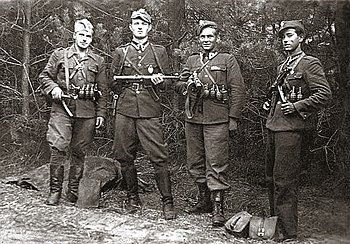Polish anti-communist insurgency
| Anti-communist resistance in Poland | |||||||
|---|---|---|---|---|---|---|---|
| Part of Eastern European anti-Communist insurgencies | |||||||
 "Cursed soldiers" of the anti-Communist underground. |
|||||||
|
|||||||
| Belligerents | |||||||
|
|
|
||||||
| Commanders and leaders | |||||||
|
August Emil Fieldorf Witold Pilecki Zygmunt Szendzielarz Józef Kuraś Others |
Bolesław Bierut Stanisław Radkiewicz Konstantin Rokossovsky Lavrentiy Beria Ivan Serov |
||||||
| Units involved | |||||||
| ...and others | |||||||
| Strength | |||||||
| 20,000 partisans | 2,000,000 Red Army soldiers 35,000 NKVD officers 24,000 Polish soldiers and Ministry of Public Security officers |
||||||
| Casualties and losses | |||||||
|
|
||||||
| 10,000 civilians killed | |||||||
The anti-communist resistance in Poland, also referred to as the Polish anti-Communist insurrection fought between 1944 and 1946 (and up until 1953), was an armed struggle by the Polish Underground against the Soviet takeover of Poland at the end of World War II in Europe. The guerrilla warfare conducted by the resistance movement formed during the war, included an array of military attacks launched against Communist prisons, state security offices, detention facilities for political prisoners, and prison camps set up across the country by the Stalinist authorities.
In January 1945, the pro-Soviet government installed in Poland by the advancing Red Army declared as "illegal" the Polish anti-Nazi resistance movement, principally the Home Army or the Armia Krajowa, and ordered its surviving members to come out into the open while guaranteeing them freedom and safety. Many underground fighters decided to lay down their arms and register, but after doing so, most of them were arrested and thrown in prison. Thousands of them were tortured and later deported into the Soviet Gulag camp system, or tried by Kangaroo courts and murdered out of sight after extreme beatings (see, the Uroczysko Baran killing fields among similar others).
As a result of repression, Armia Krajowa (AK) members quickly stopped trusting the new government, and some of them regrouped in a clandestine manner in order to oppose the new Soviet occupiers. They formed various post-AK resistance organisations, such as Wolność i Niezawisłość ("Freedom and Sovereignty"), and liberated hundreds of political prisoners. They became known as the "Cursed soldiers" of the Polish underground, and most were eventually captured or killed by the security services and special assassination squads.
...
Wikipedia
